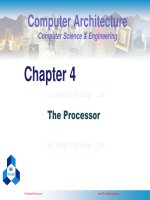kiến trúc máy tính võ tần phương ex2 solution 071 sinhvienzone com
Bạn đang xem bản rút gọn của tài liệu. Xem và tải ngay bản đầy đủ của tài liệu tại đây (37.66 KB, 8 trang )
ICS 233 - Computer Architecture
& Assembly Language
Exam II – Fall 2007
Saturday, December 8, 2007
7:00 pm – 9:00 pm
Computer Engineering Department
College of Computer Sciences & Engineering
King Fahd University of Petroleum & Minerals
Student Name:
SOLUTION
Student ID:
Q1
/ 15
Q2
/ 15
Q3
/ 25
Q4
/ 20
Q5
/ 25
Total
/ 100
Important Reminder on Academic Honesty
Using unauthorized information or notes on an exam, peeking at others work, or
altering graded exams to claim more credit are severe violations of academic
honesty. Detected cases will receive a failing grade in the course.
Prepared by Dr. Muhamed Mudawar
CuuDuongThanCong.com
Page 1 of 8
/>
Page 2 of 8
Q1. (10 pts) Using the refined multiplication hardware, show the unsigned multiplication of:
Multiplicand = 01101101 by Multiplier = 10110110
The result of the multiplication should be a 16 bit unsigned number in HI and LO
registers. Eight iterations are required. Show your steps.
Iteration
0: Initialize
Multiplicand
01101101
Carry
HI
00000000
LO
10110110
00000000
01011011
01101101
01011011
00110110
10101101
10100011
10101101
3: Shift right
01010001
11010110
4: Shift right
00101000
11101011
10010101
11101011
01001010
11110101
10110111
11110101
6: Shift right
01011011
11111010
7: Shift right
00101101
11111101
10011010
11111101
01001101
01111110
1: Shift right
2: LO[0] = 1
ADD
0
2: Shift right
3: LO[0] = 1
5: LO[0] = 1
ADD
ADD
0
0
5: Shift right
6: LO[0] = 1
8: LO[0] = 1
ADD
ADD
0
0
8: Shift right
Check:
Multiplicand = 011011012 = 109
Multiplier = 101101102 = 182
Product = 19838 (decimal) = 01001101 01111110 (binary)
b)
(5 pts) What is the decimal value of the following floating-point number?
1 10001101 10101000000000000000000 (binary)
Sign = negative
Exponent value = 100011012 – Bias = 141 – 127 = 14
Decimal Value = -1.101012 × 214 = -1.65625 × 214 = -27136
CuuDuongThanCong.com
/>
Page 3 of 8
Q2. (10 pts) Using the refined division hardware, show the unsigned division of:
Dividend = 11011001 by Divisor = 00001010
The result of the division should be stored in the Remainder and Quotient registers.
Eight iterations are required. Show your steps.
Iteration
0: Initialize
Remainder
00000000
Quotient
11011001
Divisor
00001010
Difference
1: SLL, Diff
00000001
10110010
00001010
< 0
2: SLL, Diff
00000011
01100100
00001010
< 0
3: SLL, Diff
00000110
11001000
00001010
< 0
4: SLL, Diff
00001101
10010000
00001010
00000011
4: Rem = Diff
00000011
10010001
5: SLL, Diff
00000111
00100010
00001010
< 0
6: SLL, Diff
00001110
01000100
00001010
00000100
6: Rem = Diff
00000100
01000101
7: SLL, Diff
00001000
10001010
00001010
< 0
8: SLL, Diff
00010001
00010100
00001010
00000111
8: Rem = Diff
00000111
00010101
Check:
Dividend = 110110012 = 217 (unsigned)
Divisor = 000010102 = 10
Quotient = 000101012 = 21 and Remainder = 000001112 = 7
b)
(5 pts) Show the Double precision IEEE 754 representation for: -0.05
0.05 * 2 = 0.1
0.1 * 2 = 0.2
0.2 * 2 = 0.4
0.4 * 2 = 0.8
0.8 * 2 = 1.6
0.6 * 2 = 1.2
0.2 * 2 = 0.4
0.05 = 0.00001100110012 = 1.100110012 × 2-5
Exponent = -5 + 1023 = 1018 = 011111110102
Double Precision Representation:
1 01111111010
1001100110011001100110011001100110011001100110011010 (rounded)
CuuDuongThanCong.com
/>
Page 4 of 8
Q3. Given x = 1 10000101 101100000000000000000012
and
y = 1 01111111 010000000000000110000002
represent single precision floating-point numbers. Perform the following operations
showing all the intermediate steps and final result in binary. Round to the nearest even.
a)
(12 pts) x + y
Exponent Value(x) = 100001012 – bias = 133 – 127 = 6
Exponent Value(y) = 011111112 – bias = 127 – 127 = 0
- 1.101 1000 0000 0000 0000 00012 × 26
- 1.010 0000 0000 0000 1100 00002 × 20
- 1.101 1000 0000 0000 0000 00012 × 26
- 0.000 0010 1000 0000 0000 0011
0000002 × 26 (shift)
- 1.101 1010 1000 0000 0000 0100
0000002 × 26 (add)
- 1.101 1010 1000 0000 0000 0100
× 26 (rounded)
Result = 1 10000101 10110101000000000000100
CuuDuongThanCong.com
/>
Page 5 of 8
Q3. b) (13 pts) x × y
Biased exponent = 100001012 + 011111112 – 127 = 100001012
Result sign = 0 (positive)
1.101100000000000000000012
× 1.010000000000000110000002
110110000000000000000001
110110000000000000000001
110110000000000000000001
1.10110000000000000000001
10.0001110000000010100010101000000000000011
Normalize and adjust exponent:
1.00001110000000010100010
1
010000000000000112
Biased exponent = 100001012 + 1 = 100001102
Round to nearest even:
Round bit = 1, Sticky bit = 1 (OR of remaining bits)
Rounded Significand = 1.000011100000000101000102 + 1
= 1.000011100000000101000112
Product = 0 10000110 000011100000000101000112
CuuDuongThanCong.com
/>
Page 6 of 8
Q4. (20 pts) A program, being executed on a processor, has the following instructions mix:
Operation Frequency Clock cycles per instruction
ALU
40 %
2
Load
20 %
10
Store
15 %
4
Branches
25 %
3
a)
(3 pts) Compute the average clock cycles per instruction
Average CPIa = 0.4*2 + 0.2*10 + 0.15*4 + 0.25*3 = 4.15
b)
(6 pts) Compute the percent of execution time spent by each class of instructions
Operation Frequency CPI
ALU
40 %
2
Load
20 %
10
Store
15 %
4
Branches
25 %
3
c)
CPI * Frequency
0.8
2.0
0.6
0.75
% Execution Time
0.8 / 4.15 = 19.3%
2.0 / 4.15 = 48.2%
0.6 / 4.15 = 14.4%
0.75 / 4.15 = 18.1%
(6 pts) A designer wants to improve the performance. He designs a new execution unit
that makes 80% of ALU operations take only 1 cycle to execute. The other 20% of ALU
operations will still take 2 cycles to execute. The designer also wants to improve the
execution of the memory access instructions. He does it in a way that 95% of the load
instructions take only 2 cycles to execute, while the remaining 5% of the load
instructions take 10 cycles to execute per load. He also improves the store instructions
in such a way that each store instruction takes 2 cycles to execute.
Compute the new average cycles per instruction
Average CPIc =
d)
0.8*0.4*1 + 0.2*0.4*2 +
0.2*0.95*2 + 0.2*0.05*10 +
0.15*2 + 0.25*3 = 2.01
(2 pts) What is the speedup factor by which the performance has improved in part c?
Speedup = 4.15 / 2.01 = 2.06 (I-count & clock are the same)
e)
(3 pts) The designer decides to improve the clock speed in such a way to triple the
overall performance of the original CPU specified in part a.
By what factor should the clock rate be improved if the designer uses the design
specified in part c?
Speedup = (CPIa / CPIc) * (Clock Ratec/Clock Ratea)
Speedup = 3 = (4.15/2.01) * (Clock Ratec/Clock Ratea)
Clock should be faster by 3/2.06 = 1.45 (45% faster)
CuuDuongThanCong.com
/>
Page 7 of 8
Q5. (25 pts) The following code fragment processes two double-precision floating-point
arrays A and B, and produces an important result in register $f0. Each array consists of
10000 double words. The base addresses of the arrays A and B are stored in $a0 and
$a1 respectively.
loop:
a)
ori
sub.d
$t0, $zero, 10000
$f0, $f0, $f0
ldc1
ldc1
mul.d
add.d
addi
addi
addi
bne
$f2,
$f4,
$f6,
$f0,
$a0,
$a1,
$t0,
$t0,
0($a0)
0($a1)
$f2, $f4
$f0, $f6
$a0, 8
$a1, 8
$t0, -1
$zero, loop
(6 pts) Write the code in a high-level language, and describe what is produced in $f0.
for (i=0; i<10000, i++) sum = sum + A[i] * B[i];
Compute the dot product and return sum in $f0.
c)
(5 pts) Count the total number of instructions executed by all the iterations (including
those executed outside the loop).
Instruction Count = 2 + 10000 * 8 = 80002
CuuDuongThanCong.com
/>
Page 8 of 8
d)
(14 pts) Assume that the code is run on a machine with a 2 GHz clock that requires the
following number of cycles for each instruction:
Instruction
Cycles
addi, ori
1
ldc1
3
add.d, sub.d
5
mul.d
6
bne
2
(7 pts) How many cycles does it take to execute the above code?
Clock cycles = 1 (ori) + 5 (sub.d) + 10000 * (2*3 (ldc1) +
6 (mul.d) + 5 (add.d) + 3*1 (addi) + 2 (bne))
= 6 + 10000 * 22 = 220006 cycles
(3 pts) How many second to execute the above code?
Execution time = cycles / clock rate = 220006/2 nsec
= 110003 nsec = 110 usec = 0.11 msec = 0.00011 seconds
(2 pts) What is the average CPI for the above code?
Average CPI = Clock Cycles / Instruction-Count =
Average CPI = 220006 / 80002 = 2.75
(2 pts) What is the MIPS rate for the above code?
MIPS rate = 80002 / 110 usec = 727.3 MIPS
CuuDuongThanCong.com
/>









